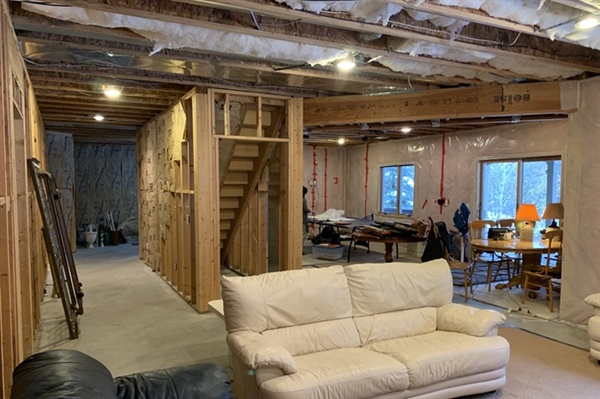What Are the Common Mistakes to Avoid in a Home Remodeling Project?

Home remodeling projects can be exciting and transformative, but they also come with a fair share of challenges. Many homeowners make costly mistakes that lead to unexpected delays, budget overruns, and disappointing results.
Whether it’s a kitchen upgrade, a bathroom renovation, or a full home remodel, avoiding common pitfalls can save time, money, and stress. A well-planned project ensures not only a beautiful outcome but also long-term functionality and increased property value.
In this article, we’ll explore the most common mistakes homeowners make during remodeling projects. We’ll discuss how poor budgeting leads to unexpected costs, why hiring the cheapest contractor isn’t always the best choice, and all the other risks associated with skipping permits and inspections.
Understanding these potential issues will help ensure your remodeling project runs smoothly and delivers the best return on investment!
How Does Poor Budgeting Lead to Unexpected Costs in Remodeling?
One of the biggest mistakes homeowners make during remodeling is underestimating costs. A poorly planned budget often fails to account for hidden expenses such as structural repairs, material price fluctuations, and labor overruns. Unexpected problems, such as outdated wiring or plumbing issues, can quickly drive up costs. Without a financial cushion, homeowners may find themselves forced to cut corners or delay the project.
Additionally, failing to set priorities can result in overspending on less critical features while neglecting essential upgrades. A well-structured budget should include a contingency fund of at least 10-20% to accommodate unforeseen expenses. Working with a professional remodeler can also help establish realistic cost estimates and prevent budget shortfalls.
To keep your project on track financially, it’s crucial to work with an experienced contractor and have a detailed plan before construction begins. Home remodeling experts can provide accurate estimates and help allocate funds wisely to avoid financial surprises.
Why Is Hiring the Cheapest Contractor Not Always the Best Option?
Choosing a contractor based solely on the lowest bid is a common mistake that can lead to major problems. While saving money is important, the cheapest option often comes at the expense of quality, reliability, and expertise. Low-cost contractors may cut corners by using subpar materials, hiring unskilled labor, or failing to follow proper building codes.
Additionally, some low-bid contractors provide vague estimates that do not include essential work, leading to costly change orders later. They may also lack the necessary licensing, insurance, or experience to handle complex renovations, increasing the risk of structural issues and project delays.
Instead of focusing solely on price, homeowners should evaluate contractors based on experience, reputation, and past work. Checking references, verifying credentials, and reviewing contracts thoroughly can prevent costly mistakes and ensure a high-quality remodel.
What Are the Risks of Skipping Proper Permits and Inspections?
Skipping permits and inspections might seem like a way to save time and money, but it can lead to serious legal and financial consequences. Building codes exist to ensure safety, structural integrity, and compliance with local regulations. Failing to obtain the necessary permits can result in hefty fines, project delays, or even a forced teardown of unauthorized work.
Additionally, unpermitted work can create problems when selling a home. Buyers and lenders often require proof that renovations were completed legally. If an inspection reveals code violations, homeowners may be forced to make costly corrections before completing a sale.
Working with a reputable contractor ensures that all necessary permits are obtained, inspections are completed, and work is performed according to code. This not only protects homeowners from legal issues but also ensures the long-term safety and value of the property.
How Can Poor Space Planning Negatively Impact a Renovation?
Space planning is one of the most critical aspects of a successful remodel. Poor planning can lead to inefficient layouts, wasted space, and design elements that don’t fit a home’s functionality. For example, a kitchen remodel with insufficient counter space or an awkward appliance placement can make cooking and entertaining frustrating.
Another common issue is failing to consider traffic flow and accessibility. A poorly designed floor plan can result in cramped hallways, doors that don’t open fully, or inconveniently placed furniture and fixtures. Inadequate storage solutions can also diminish a home’s livability, making everyday use cumbersome.
To avoid these issues, homeowners should work with professional designers and contractors to optimize space. Careful planning ensures that renovations enhance both aesthetics and practicality, creating a home that functions well for years to come.
Why Is Neglecting Future Home Resale Value a Costly Mistake?
While remodeling should cater to a homeowner’s current needs, it’s also important to consider how upgrades impact resale value. Over-personalized or trendy designs may appeal to the current owner but could make it difficult to sell the home later. For example, bold color schemes, unconventional layouts, or excessive customizations may limit buyer interest.
Additionally, spending too much on renovations without considering the home’s market value can result in a poor return on investment. Over-improving a property beyond the standard for its neighborhood can make it challenging to recoup costs upon resale.
Smart renovations balance personal preference with market appeal. Focusing on timeless design elements, energy-efficient upgrades, and high-quality finishes can boost a home's value and attract future buyers. Homeowners looking for expert advice on strategic renovations should consider consulting with Tschida Construction to ensure their investments pay off! For your inquiries, please call us at 952-201-4190 or visit our office located at 6720 County Road 140, Cologne, MN 55322.